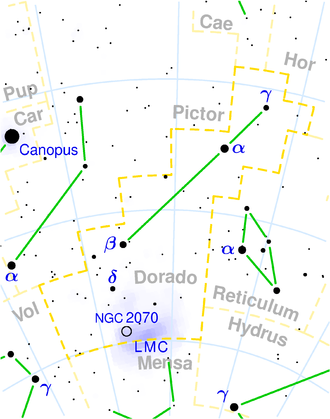NGC 1688
| Galaxy NGC 1688 |
|
|---|---|

|
|
| Photo from the Hubble Space Telescope | |
| AladinLite | |
| Constellation | Swordfish |
|
Position equinox : J2000.0 , epoch : J2000.0 |
|
| Right ascension | 04 h 48 m 23.8 s |
| declination | -59 ° 48 ′ 01 ″ |
| Appearance | |
| Morphological type | SB (rs) dm |
| Brightness (visual) | 11.6 mag |
| Brightness (B-band) | 12.3 mag |
| Angular expansion | 2.4 ′ × 1.9 ′ |
| Position angle | 177 ° |
| Surface brightness | 13.1 mag / arcmin² |
| Physical data | |
| Affiliation | NGC 1672 group LGG 119 |
| Redshift | 0.004095 ± 0.000019 |
| Radial velocity | 1228 ± 6 km / s |
|
Stroke distance v rad / H 0 |
(47 ± 3) x 10 6 ly (14.3 ± 1.0) Mpc |
| history | |
| discovery | John Herschel |
| Discovery date | 4th December 1834 |
| Catalog names | |
| NGC 1688 • PGC 16050 • ESO 119-006 • IRAS 04476-5953 • 2MASX J04482378-5948011 • SGC 044739-5953.2 • GC 925 • h 2671 • AM 0447-595 • HIPASS J0448-59 • LDCE 328 NED019 | |
NGC 1688 is a bar-spiral galaxy of the Hubble type SBc in the constellation Swordfish in the southern sky . It is an estimated 47 million light years away from the Milky Way and about 35,000 light years across .
NGC 1688 is a member of the small NGC 1672 - Galaxy Group which also includes still NGC 1824 and NGC 1703 are.
The object was discovered on December 4, 1834 by the astronomer John Herschel with an 18.7-inch telescope .
Web links
Commons : NGC 1688 - collection of images, videos, and audio files
